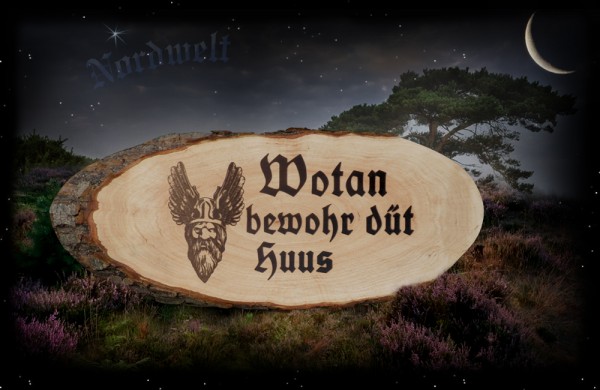Cookie preferences
This website uses cookies, which are necessary for the technical operation of the website and are always set. Other cookies, which increase the comfort when using this website, are used for direct advertising or to facilitate interaction with other websites and social networks, are only set with your consent.
Mural - wooden disc "Wotan bewohr düt Huus" (Wotan preserve this house)
Order number: 65.023 Bark slices - "Mural" with the Low German saying: "Wotan bewohr düt Huus" (in high German:... more
Product information "Mural - wooden disc "Wotan bewohr düt Huus" (Wotan preserve this house)"
Bark slices - "Mural" with the Low German saying: "Wotan bewohr düt Huus" (in high German: "Wotan keep this house" / home)
Protection symbol, as wall decoration to hang over the front door, apartment door, window etc.
Written in the approx. 800 year old Heide-Platt (Lüneburg Heath region and the Aller)
It is the area of the West Germanic tribe of the "Dulgubnier", which later merged into the Langobard immigrated from the Elbe region!
Since we see ourselves as descendants of the West German tribes, we deliberately wrote in the original language (and also write "Wotan" as Germans - not "Odin" as is usual with the Vikings)!
The West-Low German Low German is a West Germanic language, also related to the Frisian Low German and the North Sea Germanic language - these come from the Indo-European original language!
Heideplatt (West Germanic): "Wotan preserved for Huus" -
translated into the High German language: Wotan keep this house, or: Wotan protect this house.
Wotan or Wodan
Wotan or Wodan is translated as "anger". Oðr, translated from old Norse to "anger", also "cultic ecstasy" (god of ecstasy) was the eponym for the North Germanic Odin and southern Germanic Wotan.
The god was called "Wodan" in Old Franconian, "Wotan" or "Godan" in Lombard, "Woden" in Saxon / Anglo-Saxon and "Wuotan" in Old High German -
Godfather, god of war and death, god of poetry and runes, magic and ecstasy.
Variants that are used among many others: Wodan, Vodan, Vodams, Guodan, Gudan, Voden, Wuotan as well as Óðin and Odinn.
Many epithets and aliases are known: Allvater, Gunnarr, Gagnrad, Har, herfadir, Harbard (gray beard), Herjann, Herteitr, Valfadir, Walvater, Wegtam
Odin (north. Óðin, Odinn, South Germanic Wodan, Wotan, Wuotan, Wode, means ahd. The angry), Atridi (the person who is riding); Longobards Odan and Godan; north frieze. Wede, Wedke; Othan, Odon, Eovden; low Jivodan.
The alder, a tree more than 3000 years old and its meaning in mysticism:
Written in the approx. 800 year old Heide-Platt (Lüneburg Heath region and the Aller)
It is the area of the West Germanic tribe of the "Dulgubnier", which later merged into the Langobard immigrated from the Elbe region!
Since we see ourselves as descendants of the West German tribes, we deliberately wrote in the original language (and also write "Wotan" as Germans - not "Odin" as is usual with the Vikings)!
The West-Low German Low German is a West Germanic language, also related to the Frisian Low German and the North Sea Germanic language - these come from the Indo-European original language!
Heideplatt (West Germanic): "Wotan preserved for Huus" -
translated into the High German language: Wotan keep this house, or: Wotan protect this house.
Wotan or Wodan
Wotan or Wodan is translated as "anger". Oðr, translated from old Norse to "anger", also "cultic ecstasy" (god of ecstasy) was the eponym for the North Germanic Odin and southern Germanic Wotan.
The god was called "Wodan" in Old Franconian, "Wotan" or "Godan" in Lombard, "Woden" in Saxon / Anglo-Saxon and "Wuotan" in Old High German -
Godfather, god of war and death, god of poetry and runes, magic and ecstasy.
Variants that are used among many others: Wodan, Vodan, Vodams, Guodan, Gudan, Voden, Wuotan as well as Óðin and Odinn.
Many epithets and aliases are known: Allvater, Gunnarr, Gagnrad, Har, herfadir, Harbard (gray beard), Herjann, Herteitr, Valfadir, Walvater, Wegtam
Odin (north. Óðin, Odinn, South Germanic Wodan, Wotan, Wuotan, Wode, means ahd. The angry), Atridi (the person who is riding); Longobards Odan and Godan; north frieze. Wede, Wedke; Othan, Odon, Eovden; low Jivodan.
The alder, a tree more than 3000 years old and its meaning in mysticism:
- The alder is a PROTECTIVE tree that grows in damp places and bogs also a ghost and dead tree, consecrated / assigned to the god Wotan.
- The alder was the gateway to Valhalla, the world of the gods and the dead
- The alder also stands for the protective and the life-giving:
- Legend branches were hung over the cradle in newborns
- Alms branches were hung in the house and in the yard for protection
- Legend branches were also placed under the pillow to protect against nightmares.
- The Erlkönig (Ellerkönig = Wotan), led the alder women, elves or Valkyries.
For the alder also Eller and Else translated:
- Old High German erla, elira, eller = alder / Eller / Else
- Middle Low German else
- Old Norse elre
- english alder
- Anglo-Saxon alor
- Latin alnus (growing in damp places)
- Indo-European al (swamp water hole)
Branded Wotan head with saying "Wotan bewohr du Huus"!
Made of double-edged alder wood.
The back has a hole to hang the mural.
- Size: about 13,39 5,91 inch (34 x 15 cm)
- Weight approx. 1- 1,43 lbs (450 - 650 g.)
Every mural is unique.
Northworld gift idea
Price per piece.
Related links to "Mural - wooden disc "Wotan bewohr düt Huus" (Wotan preserve this house)"
Read, write and discuss reviews... more
Customer evaluation for "Mural - wooden disc "Wotan bewohr düt Huus" (Wotan preserve this house)"
Write an evaluation
Evaluations will be activated after verification.
Folgende Infos sind verfübar...... more
Firma
Nordwelt Versand GmbH
An der Windmühle 1
31079 Sibbesse
Deutschland
An der Windmühle 1
31079 Sibbesse
Deutschland
+495065963700
Verantwortliche Person
Nordwelt Versand GmbH, Geschäftsführer Oliver Bode
An der Windmühle 1
Nordwelt Verasand GmbH
31079 Sibbesse
Deutschland
An der Windmühle 1
Nordwelt Verasand GmbH
31079 Sibbesse
Deutschland
+49 1732490500
Customers also bought
Customers also viewed
Viewed












































